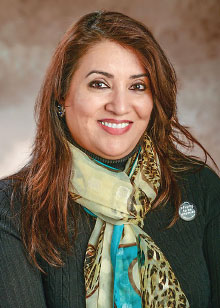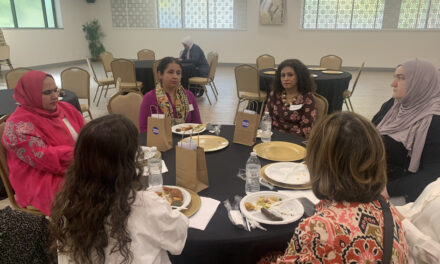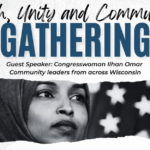Photo by Cedric Fauntleroy
The Muslim Mental Health Conference has become a safe space for researchers, clinicians, and community and religious leaders to come together and build a cohesive movement to benefit patients.
The 15th Annual Muslim Mental Health Conference that convened in East Lansing, Mich., this past spring was the continuation of dream turned reality for Farha Abbasi, M.D., an assistant professor of psychiatry at Michigan State University’s College of Osteopathic Medicine.
The original conference arose after Abbasi received an APA/APAF SAMHSA Minority Fellowship in 2009. She had observed that Muslims in the United States were showing up in her clinic in disproportionately low numbers, even though Michigan is home to a high concentration of Muslim Americans. They were, she concluded, an underserved population for a complex set of cultural and religious reasons. Like other religious groups, they often struggled when confronted with mental illness, often attributing its cause to some spiritual failing. The resulting stigma blocked awareness, engagement, and treatment.
In addition, Muslims’ status as a minority group within American society often meant that they had higher mental health needs but fewer available resources, said Abbasi. In the past, mental health problems were swept under the rug because of fear or shame.
“People thought mental illness was someone else’s problem, but now we see more openness about these issues,” she said. “What happens in the general society affects the Muslim community and vice versa.”
The success of that first conference also revealed to mental health professionals who treat Muslims the value of continuing to meet annually to discuss the myriad issues facing their community—or rather their communities. The Muslim population in this country is quite diverse. There are immigrants from many different Muslim-majority countries in South Asia, the Middle East, and Africa, but also the American-born children and grandchildren of immigrants who face their own issues. Some refugees have lived through trauma and violence in their countries of origin and now must cope with that history as they try to adjust to living in a new home.

As an APA/APAF SAMHSA Minority Fellow, Farha Abbasi, M.D., was inspired to launch the Muslim Mental Health Conference.
The most recent conference, in contemporary hybrid form, had 500 attendees, in person and online, representing 30 countries, said Abbasi. Plus, there were at least 6,000 page views via the conference’s mobile app. About 120 talks or posters were presented in parallel sessions at this year’s conference.
Sessions included “Recommendations for Managing ADHD During Ramadan,” “Islamic-Based Psychological Concepts,” “Suicidal Behaviors in Muslim Youth,” and “Healing From Islamophobia.” In addition, 50 Muslim religious leaders took part in an eight-hour training sequence.
“People now understand the worth of the conference,” Abbasi told Psychiatric News. “It has become a viable, safe space where everyone involved—researchers, clinicians, and community and religious leaders—can come together and communicate to build a cohesive movement to benefit patients.”
One point that has helped her and her colleagues overcome stigma about mental illness within the Muslim community is that modern psychological concepts often can be analogized to spiritual ideas like “soul, or mind, or heart” and thus translated for clinical use, she said. Those are ideas she also teaches medical and nursing students to prepare them to offer culturally appropriate care to Muslim patients.
“Muslim mental health is now a specialized field, and Muslim mental health professionals are now committed to this as a specialty,” she said. “It is a disservice to take faith and spirituality out of medical studies. They can be a part of your problem or a part of your treatment. It’s not treating the diseases; it’s treating the patient.”
Culturally and religiously sensitive treatment also can reduce hospital stays, she said.
Abbasi has shared her expertise with co-religionist colleagues in countries such as Jordan, Malaysia, Indonesia, Turkey, and her native Pakistan to improve their mental health services.
In March, Xavier Becerra, secretary of the Department of Health and Human Services, recognized Abbasi for her work on minority mental health as one of 15 American women who have shown “extraordinary leadership on behalf of humanity.” Receiving this award will help sharpen the focus on the stigma and shame that silences mental illnesses in minority settings, she believes. ■













